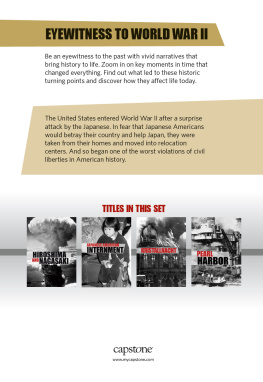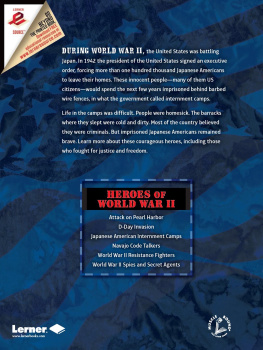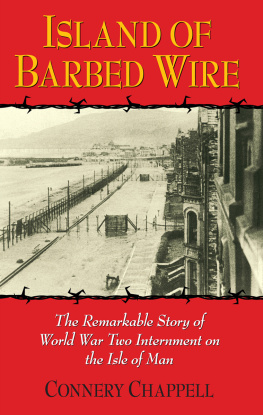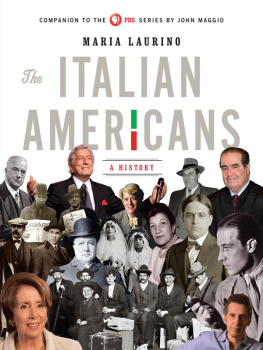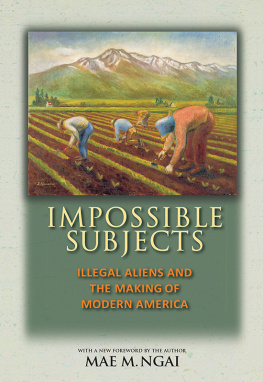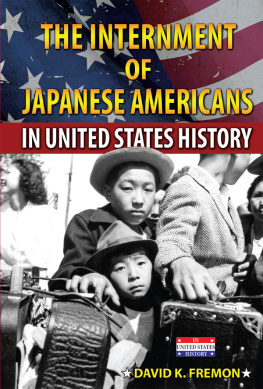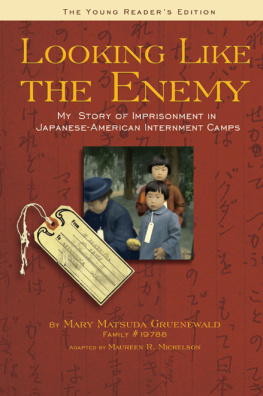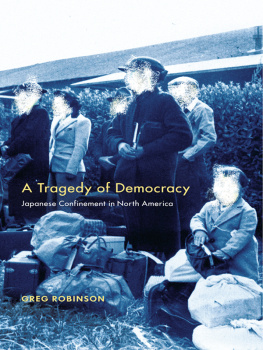Contents
Guide
Pagebreaks of the print version

Searching for Subversives
Searching for Subversives
The Story of Italian Internment in Wartime America
Mary Elizabeth Basile Chopas
The University of North Carolina Press CHAPEL HILL
This book was published with the assistance of the H. Eugene and Lillian Lehman Fund of The University of North Carolina Press.
2017 The University of North Carolina Press
All rights reserved
Set in Espinosa Nova by Westchester Publishing Services
Manufactured in the United States of America
The University of North Carolina Press has been a member of the Green Press Initiative since 2003.
Library of Congress Cataloging-in-Publication Data
Names: Chopas, Mary Elizabeth Basile, author.
Title: Searching for subversives : the story of Italian internment in wartime America / Mary Elizabeth Basile Chopas.
Description: Chapel Hill : University of North Carolina Press, [2017] | Includes bibliographical references and index.
Identifiers: LCCN 2017013167 | ISBN 9781469634333 (cloth : alk. paper) | ISBN 9781469634340 (pbk : alk. paper) | ISBN 9781469634357 (ebook)
Subjects: LCSH : Italian AmericansEvacuation and relocation, 1942. | ImmigrantsGovernment policyUnited States. | ItaliansGovernment policyUnited States. | ItaliansLegal status, laws, etc.United StatesHistory19331945. | Concentration campsUnited States. | World War, 19391945Concentration campsUnited States. | World War, 19391945Italian Americans.
Classification: LCC D 769.8.F7 I825 2017 | DDC 940.53/177308951dc23
LC record available at https://lccn.loc.gov/2017013167
Cover illustration: Italian flag istockphoto.com/powerofforever.
Stone wall istockphoto.com.
For my parents, with love and respect.
And for my husband, Jim, with devotion.
Contents
Illustrations
Acknowledgments
The seed for this project was planted many years ago when, as a little girl, I used to hear my grandfather Joseph Carroccia tell stories about life in America as an Italian immigrant. In the 1930s, he made frequent trips back and forth between Italy and the United States, where he worked to raise enough money to build a home and arrange for the transatlantic passage of his wife and young children, including my mother. When World War II started, my grandparents had been settled permanently in Farmington, Connecticut, for a number of years and were raising a family. Since they were aliens, they were subject to nighttime visits by government officials searching for contraband items. My mother described these dreadful incidents to me on several occasions so that I might appreciate our familys history.
Many years later, when researching another project at the Harvard Law School Library, I fortuitously came across the alien enemy hearing board files of Erwin Griswold, who had served on Bostons board. I would later discover that Griswolds board records provided the sharpest lens into the process of selective internment, which would become the basis for my exploration of this topic. This finding triggered memories of my own familys stories about their wartime experiences and piqued my interest to find out more. When I moved to Chapel Hill in 2007 and began teaching at UNC Law School, I had the good fortune of working with Eric Muller who generously shared with me resources relevant to Italian internment that he had come across in his scholarship on the Japanese American internment. He encouraged me to pursue this little-researched topic and offered the most valuable guidance to me from early drafts through the finish of this project.
In the initial stage, my research assistants Lee Turbyfill and Caitlin Carson conducted invaluable legal research for me. When I had the opportunity to turn this topic conceived from a legal perspective into a broader historical project, I benefited greatly from the expert military history knowledge of Wayne Lee and Richard Kohn, who commented on multiple drafts, as well as the suggestions of Zaragosa Vargas regarding research in ethnic history, and the thoughts of Heather Williams on the social history chapter. Kathleen DuVal gave me constructive feedback on my presentation of the social profile of internees. With the help of Peter Feaver, I was able to construct an Afterword that tied the questions I asked as a historian to current issues of national security. At various stages of developing the manuscript, I received comments and suggestions from a wide circle of scholars. I would like to thank participants in the Triangle Legal History Seminar; the Triangle Institute for Security Studies New Faces Conference; the Research Triangle Seminar Series on the History of the Military, War, and Society; and the Legal History Roundtable at Boston College Law School for their contributions. In particular, I appreciate my friends and colleagues Al Brophy and Nora Doyle who inspired me with their scholarship and never tired of engaging in conversations with me about mine. In the final stage of revisions, Gary Morminos insightful comments improved my depiction of Italian Americans and presentation of key events. At UNC Press, I am grateful to Chuck Grench for his support of this project throughout revisions and the production of the manuscript and to Rich Hendel for the cover illustration. I would also like to thank Stacey Byrd at the UNC Kathrine R. Everett Law Library for tracking down endless books for me, and Ashley Arthur for assisting me with formatting several versions of the manuscript.
During the entire course of this project, I consulted with many archivists who led me to the original sources that are the foundation of this book. Several deserve special recognition. I am indebted to Marian Smith of the Historical Research Branch of the U.S. Citizenship & Immigration Services for providing me with crucial materials and for patiently and cheerfully explaining some technical immigration issues to me. At the Harvard Law School Librarys Historical & Special Collections, I am grateful to David Warrington, Lesley Schoenfeld, and Edwin Moloy for generously providing me access to Erwin Griswolds Papers and answering my inquiries. Elizabeth Gray at the National Archives at College Park helped me navigate the Italian internee files and numerous other government files during my visits there. Nicole Webb at the Historical Museum at Fort Missoula provided me with a collection of photographs from which illustrations in this book were chosen. Kendra Lightner at the FDR Presidential Library assisted me in locating some great nuggets of sources from the Roosevelt administration. Finally, when filling in gaps in citations to government documents, I relied upon Rene Bosman at UNCs Davis Library who brought to my attention sources that significantly improved my presentation of comparative population data.
Without the love and support of my family, this book would not have been possible. My most wonderful parents, Joseph and Angela Basile, who have nurtured my love of learning from a very young age, have provided me with constant support in this endeavor. I appreciate my brothers Joe and John, and especially thank Joe for enthusiastically assisting me by photographing Sand Island, Hawaii. My two sweet angels, Maria and Sophia, who have put up with Mommys many vacations to the archives, have given me the best kind of distractions along the way. Finally, my greatest debt is to my loving husband, Jim Chopas, who has been a partner to me in every sense, from debating issues and helping me analyze statistical data to providing me with humor to keep my spirits strong through the finish of this marathon.


